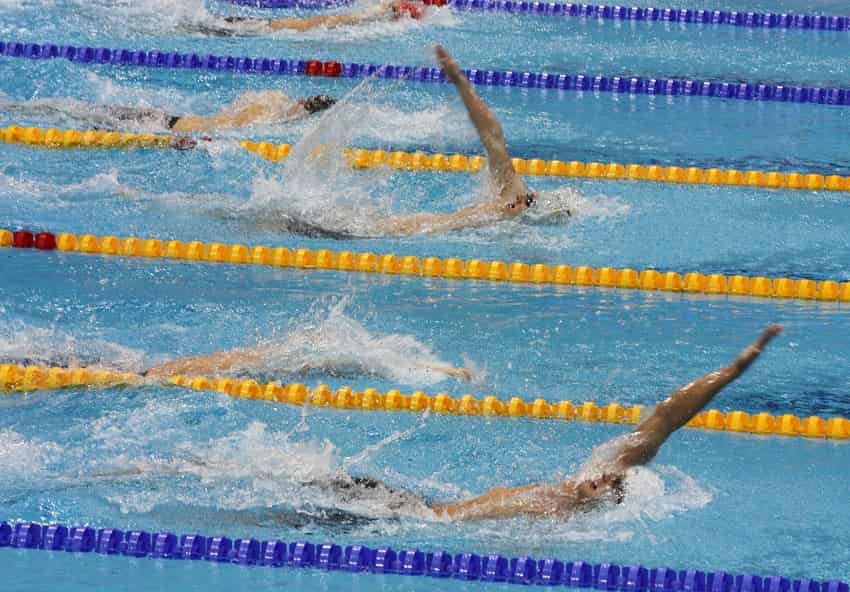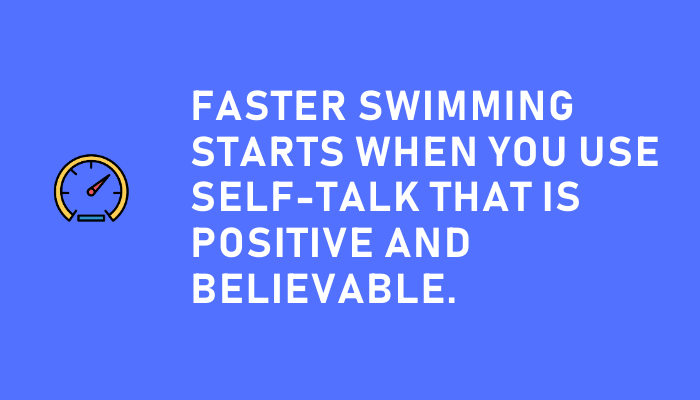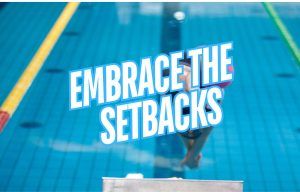The way you talk to yourself while you are swimming basically decides how things are going to go.
Killer self-talk is the thing you rely on to keep pushing when things get tough (“You got this little buddy!”) and it also helps you sharpen your technique (“Roll your shoulders you sick beauty!”).
In this post we are gonna cover how better killer self-talk can also improve your endurance and make workouts feel a little less ouchie.
Self-talk helps boost endurance
Let’s be honest for a second here: working hard is, well, hard.
That’s obvious.
It’s a constant mental battle to push ourselves, stay focused on our technique, not lose count of reps/intervals/rounds, stay positive and motivated, and dodge the butterflier with a fifteen-foot wingspan.
But one of the tricks of the trade that elite swimmers use to be all elite-like and conquer hard sets is using postitive self-talk.
Researchers [1] over at Brock University decided to see if this basic mental skill could help increase the tolerance for cyclists training in a hot, sweaty room.
The test was simple: 18 competitive-level cyclists did a pair of time trials, one at 60% peak power, a little break, and then another time trial, this one to exhaustion.
The self-talk group chose individualized forms of self-talk and practiced them over a two-week span. They were also instructed to replace negative self-talk with more positive forms of self-talk.
They took phrases like, “This is brutal” and “It’s so hot in here,” with more positive and performance-boosting language, like “I can do this.”
So how did everyone do after the two-week intervention?
When all of the cyclists were tested again, the self-talk group went 25% further and reported feeling less exhausted than the control group.
Taking the next step with your self-talk
This little study likely isn’t a big surprise to most swimmers, who well know the power of the mind when it comes to conquering hard sets.
(And the power of self-talk has been studied with competitive swimmers, with self-talk accounting for a 1.5% improvement in performance in ten-weeks.)
We’ve all experienced moments in the pool where we pushed further than we thought possible, just as we have had our share of times where physically we could have pushed faster but mentally we just weren’t in it.
So let’s take advantage of self-talk to boost our ability to endure in the water.
Here’s how to get started.
Keep it believable.
This is the biggie.
Self-talk that isn’t realistic and believable not only doesn’t work, it has the counter-productive effect of making you feel feckless at making self-talk work.
You don’t even need to be overly positive with your self-talk, switching something like “I can’t do this, it’s too hard” into something like “It looks tough, but let’s see how fast I can go” is all you need to do.
Use the appropriate self-talk.
There are two kinds of self-talk that you should be aware of.
When you are trying to nail a technical element of your swimming, instructional self-talk works best: “Roll your hips!” or “Tight streamline!”
Situations that require a little bit of fuel injection to your motivation (motivational self-talk) are prime for your typical rah-rah self-talk: “You got this” or “I don’t quit!” or “Let’s go, one more rep!”
There’s also literally talking to yourself out loud. As a form of self-talk, the external kind is surprisingly effective.
Be consistent with it.
Changing your self-talk takes time and reps. Don’t get frustrated and give-up because you don’t see overnight results.
A common frustration I see with swimmers is that they will make a short-term change (using better self-talk for like, one, maybe two workouts) and expect drastic, short-term improvements.
On the days where you are a cranky-pants and tired and you aren’t digging the main set, using that fancy new self-talk will feel like a chore. But that’s precisely when you should be using.
Good days and bad days, make an effort to use the self-talk of your choosing.
Have 2 or 3 pieces of self-talk at the ready for those moments when you want to give up, or you are feeling buried by all the meters ahead, or you need a little kick to the mind-butt.
Faster, more consistent swimming awaits.
More Stuff Like This:
This Mental Training Workbook Will Help You Swim Like a Rock Star This Season. Confused about mental training? Want to unleash pro mode on your swimming this year? Learn how this mental training workbook will change your mindset and help you pummel your PB’s this season.
Why You Should Be Grading Your Effort After Practice. One of my favorite ways to stay consistent and accountable in practice is this simple technique. Takes about three seconds, and will keep you honest about the effort in the water.
















